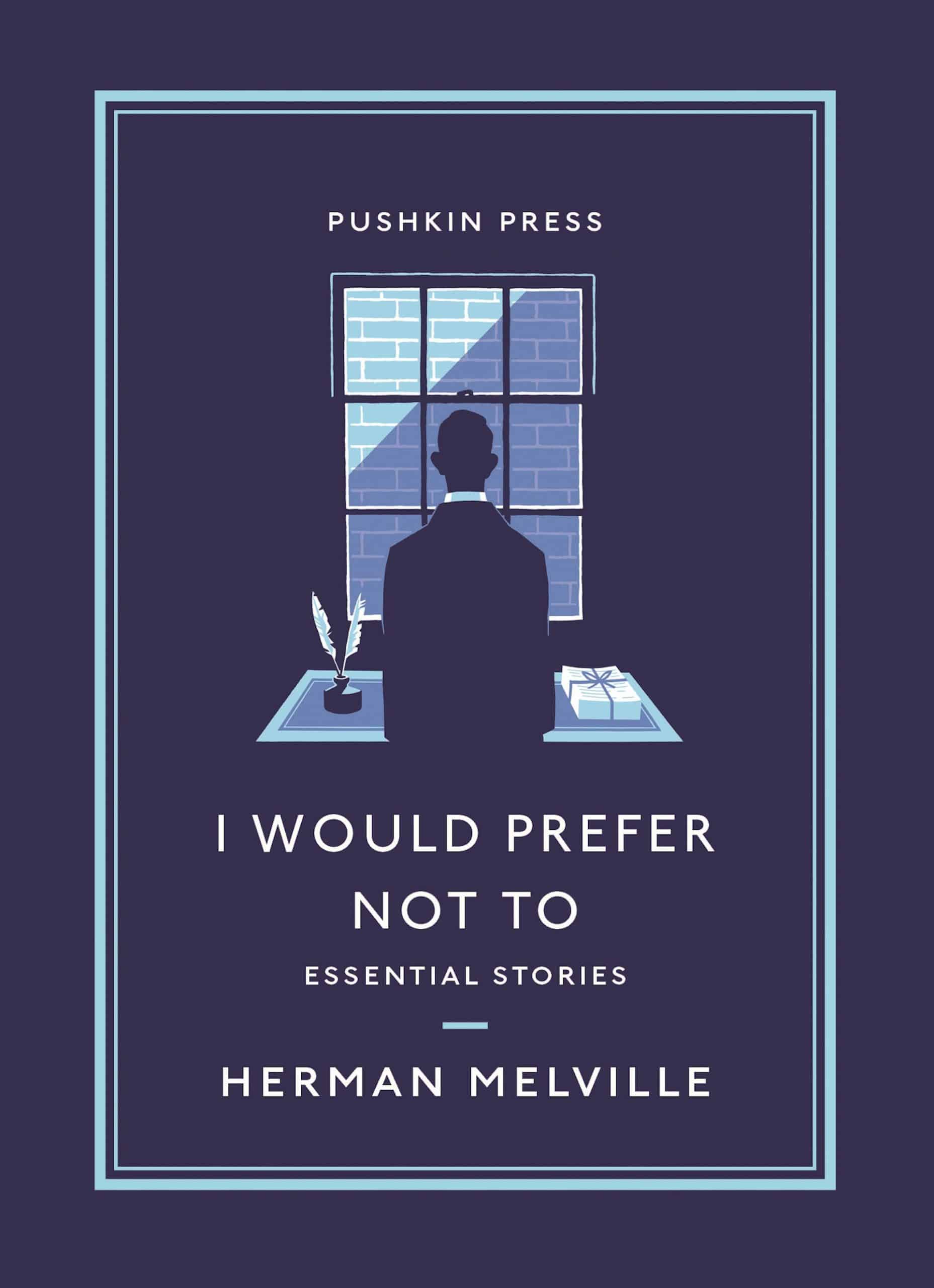I Would Prefer Not To: Essential Stories
| by |
|---|
14.00 JOD
Please allow 2 – 5 weeks for delivery of this item
Description
A new selection of Melville’s darkest and most enthralling stories in a beautiful Pushkin Collection edition Includes “Bartleby, the Scrivener”, “Benito Cereno” and “The Lightning-Rod Man”A lawyer hires a new copyist, only to be met with stubborn, confounding resistance. A nameless guide discovers hidden worlds of luxury and bleak exploitation. After boarding a beleaguered Spanish slave ship, an American trader’s cheerful outlook is repeatedly shadowed by paralyzing unease. In these stories of the surreal mundanity of office life and obscure tensions at sea, Melville’s darkly modern sensibility plunges us into a world of irony and mystery, where nothing is as it first appears.
Additional information
| Weight | 0.23 kg |
|---|---|
| Dimensions | 1.99 × 12.12 × 16.49 cm |
| PubliCanadanadation City/Country | USA |
| by | |
| Format | Paperback |
| Language | |
| Pages | 256 |
| Publisher | |
| Year Published | 2021-10-26 |
| Imprint | |
| ISBN 10 | 1782277463 |
| About The Author | Herman Melville was born to a merchant family in New York City in 1819. His father died suddenly in 1832, and Melville took jobs as a bank clerk, a farmhand and a teacher to make ends meet. In 1839, he embarked on the first in a series of sea voyages that would provide him with inspiration for his novels Typee (1846), Omoo (1847) and his great masterpiece, Moby-Dick (1851). Following poor sales and hostile reviews, Melville largely abandoned fiction writing after 1857, turning to poetry and a career as a customs inspector on the New York docks. He died in relative obscurity in 1891. |
"Melville instinctively aspired to the grandest scale, and even in his shorter works offers vast inklings and the resonance of cosmic concerns." — John Updike"Melville seems to promise the very stuff of existence: time, space, air. We don't so much read him as inhale him." — Geoffrey O'Brien, Village Voice"There are very few stories that, on re-reading after re-reading, seem to become impossibly more perfect, but Herman Melville's eerie, aching story 'Bartleby, the Scrivener' is one such." — Stuart Kelly, Guardian |
|
| Excerpt From Book | BARTLEBY, THE SCRIVENERA Story of Wall-StreetI am a rather elderly man. The nature of myavocations for the last thirty years has broughtme into more than ordinary contact with what wouldseem an interesting and somewhat singular set of men,of whom as yet nothing that I know of has ever beenwritten: – I mean the law-copyists or scriveners. I haveknown very many of them, professionally and privately,and if I pleased, could relate divers histories, at whichgood-natured gentlemen might smile, and sentimentalsouls might weep. But I waive the biographies ofall other scriveners for a few passages in the life ofBartleby, who was a scrivener the strangest I ever sawor heard of. While of other law-copyists I might writethe complete life, of Bartleby nothing of that sort canbe done. I believe that no materials exist for a full andsatisfactory biography of this man. It is an irreparableloss to literature. Bartleby was one of those beings ofwhom nothing is ascertainable, except from the originalsources, and in his case those are very small. What myown astonished eyes saw of Bartleby, that is all I knowof him, except, indeed, one vague report which willappear in the sequel.Ere introducing the scrivener, as he first appeared tome, it is fit I make some mention of myself, my employés,my business, my chambers, and general surroundings;because some such description is indispensable to anadequate understanding of the chief character aboutto be presented.Imprimis: I am a man who, from his youth upwards,has been filled with a profound conviction that theeasiest way of life is the best. Hence, though I belongto a profession proverbially energetic and nervous, evento turbulence, at times, yet nothing of that sort haveI ever suffered to invade my peace. I am one of thoseunambitious lawyers who never addresses a jury, or inany way draws down public applause; but in the cooltranquillity of a snug retreat, do a snug business amongrich men’s bonds and mortgages and title-deeds. Allwho know me, consider me an eminently safe man. Thelate John Jacob Astor, a personage little given to poeticenthusiasm, had no hesitation in pronouncing my firstgrand point to be prudence; my next, method. I donot speak it in vanity, but simply record the fact, thatI was not unemployed in my profession by the late JohnJacob Astor; a name which, I admit, I love to repeat,for it hath a rounded and orbicular sound to it, andrings like unto bullion. I will freely add, that I was notinsensible to the late John Jacob Astor’s good opinion.Some time prior to the period at which this little historybegins, my avocations had been largely increased.The good old office, now extinct in the State of New-York, of a Master in Chancery, had been conferredupon me. It was not a very arduous office, but verypleasantly remunerative. I seldom lose my temper;much more seldom indulge in dangerous indignationat wrongs and outrages; but I must be permitted to berash here and declare, that I consider the sudden andviolent abrogation of the office of Master in Chancery,by the new Constitution, as a – premature act; inasmuchas I had counted upon a life-lease of the profits,whereas I only received those of a few short years. Butthis is by the way.My chambers were up stairs at No. – Wall-street.At one end they looked upon the white wall of theinterior of a spacious skylight shaft, penetrating thebuilding from top to bottom. This view might havebeen considered rather tame than otherwise, deficientin what landscape painters call “life.” But if so, the viewfrom the other end of my chambers offered, at least, acontrast, if nothing more. In that direction my windowscommanded an unobstructed view of a lofty brick wall,black by age and everlasting shade; which wall requiredno spy-glass to bring out its lurking beauties, but for thebenefit of all near-sighted spectators, was pushed up towithin ten feet of my window panes. Owing to the greatheight of the surrounding buildings, and my chambersbeing on the second floor, the interval between this walland mine not a little resembled a huge square cistern.At the period just preceding the advent of Bartleby,I had two persons as copyists in my employment, anda promising lad as an office-boy. First, Turkey; second,Nippers; third, Ginger Nut. These may seem names,the like of which are not usually found in the Directory.In truth they were nicknames, mutually conferred uponeach other by my three clerks, and were deemed expressiveof their respective persons or characters. Turkeywas a short, pursy Englishman of about my own age,that is, somewhere not far from sixty. In the morning,one might say, his face was of a fine florid hue, but aftertwelve o’clock, meridian – his dinner hour – it blazedlike a grate full of Christmas coals; and continuedblazing – but, as it were, with a gradual wane – till 6o’clock, p.m. or thereabouts, after which I saw no moreof the proprietor of the face, which gaining its meridianwith the sun, seemed to set with it, to rise, culminate,and decline the following day, with the like regularityand undiminished glory. There are many singularcoincidences I have known in the course of my life, notthe least among which was the fact, that exactly whenTurkey displayed his fullest beams from his red and radiantcountenance, just then, too, at that critical moment,began the daily period when I considered his businesscapacities as seriously disturbed for the remainder ofthe twenty-four hours. Not that he was absolutely idle,or averse to business then; far from it. The difficultywas, he was apt to be altogether too energetic. Therewas a strange, inflamed, flurried, flighty recklessnessof activity about him. He would be incautious in dippinghis pen into his inkstand. All his blots upon mydocuments, were dropped there after twelve o’clock,meridian. Indeed, not only would he be reckless andsadly given to making blots in the afternoon, but somedays he went further, and was rather noisy. At suchtimes, too, his face flamed with augmented blazonry,as if cannel coal had been heaped on anthracite. Hemade an unpleasant racket with his chair; spilled hissand-box; in mending his pens, impatiently split themall to pieces, and threw them on the floor in a suddenpassion; stood up and leaned over his table, boxing hispapers about in a most indecorous manner, very sad tobehold in an elderly man like him. Nevertheless, as hewas in many ways a most valuable person to me, andall the time before twelve o’clock, meridian, was thequickest, steadiest creature too, accomplishing a greatdeal of work in a style not easy to be matched – forthese reasons, I was willing to overlook his eccentricities,though indeed, occasionally, I remonstrated with him.I did this very gently, however, because, though thecivilest, nay, the blandest and most reverential of menin the morning, yet in the afternoon he was disposed,upon provocation, to be slightly rash with his tongue,in fact, insolent. Now, valuing his morning services asI did, and resolved not to lose them; yet, at the sametime made uncomfortable by his inflamed ways aftertwelve o’clock; and being a man of peace, unwillingby my admonitions to call forth unseemly retorts fromhim; I took upon me, one Saturday noon (he was alwaysworse on Saturdays), to hint to him, very kindly, thatperhaps now that he was growing old, it might be wellto abridge his labors; in short, he need not come tomy chambers after twelve o’clock, but, dinner over,had best go home to his lodgings and rest himself tilltea-time. But no; he insisted upon his afternoon devotions.His countenance became intolerably fervid, ashe oratorically assured me – gesticulating with a longruler at the other end of the room – that if his servicesin the morning were useful, how indispensable, then,in the afternoon? |
| Series |
Only logged in customers who have purchased this product may leave a review.
Related products
-
On backorder 2-5 Weeks to Arrive
140.00 JOD -
On backorder 2-5 Weeks to Arrive
-
On backorder 2-5 Weeks to Arrive
90.00 JOD -
On backorder 2-5 Weeks to Arrive
120.00 JOD






Reviews
There are no reviews yet.